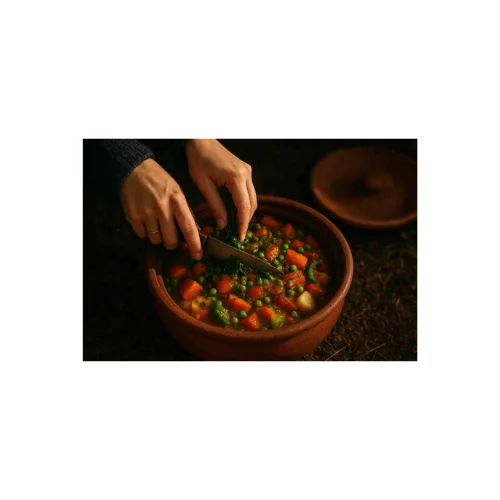
How To Practice Mindful Cooking
The goal is to minimize distractions and truly focus on your senses: the rhythm of chopping, the soothing sound of stirring, and the aroma filling the kitchen. This practice helps you cultivate gratitude for every ingredient and the process itself. By paying close attention to the colors, smells, and textures of your food, you invite a sense of calm into your environment.
The secret lies in focusing on one task at a time, letting each movement guide your awareness. Over time, you’ll find that cooking becomes more than just a routine it transforms into a gentle act of mindfulness and appreciation.
What is mindful cooking?
Mindful cooking is more than preparing a meal, it’s a journey that connects your mind, body, and senses. Unlike inactive mindful cooking, where attention drifts, active mindful cooking invites you to be fully present in every moment of the cooking process. It begins with thoughtful planning, selecting ingredients for their nutritional value and flavors, and continues as you step into the kitchen, ready to cook with calm, focus, and joy.
Feel the texture of the carrot, notice its vibrant orange color, and listen to the sound of the knife meeting the cutting board. When stirring the soup, watch the swirl made by the spoon and tune in to the simmering sound that signals warmth and comfort. This simple mindfulness practice turns food preparation into an act that enriches life, bringing health, happiness, and emotionally, physically, and mentally enjoyable meals without rushing, only appreciating the beauty of time well spent.
Practical Tip:
- Before you start cooking, take a deep breath and remind yourself that this is your moment to be present.
- Focus on each motion, the chopping, the stirring and allow the process to ground you.
Benefits of Mindful Cooking
Mindful cooking feels like a gentle form of meditation, where the kitchen becomes your space of calm and creativity. Each meal turns into a culinary journey that invites you to be present, focused, and fully engaged in the process.
When you cook mindfully, even the simple act of chopping vegetables or stirring a pot becomes meaningful, you become aware of every color, scent, and texture unfolding before you. It’s a practice that helps you slow down, notice, and truly appreciate what you’re creating.
Over time, this awareness doesn’t just nourish your body but begins to contribute to a happier, more satisfying life. Personally, I’ve found that being focused on each moment in the kitchen transforms ordinary tasks into peaceful rituals that ground and uplift me.
Mindful cooking can increase happiness
Practicing mindfulness in the kitchen transforms ordinary cooking into a positive and fulfilling experience. When you focus on each step the aroma, texture, and rhythm your mood naturally becomes happier. The space around you turns into a place where you can express your creativity and truly feel present. As you stir, chop, and taste with awareness, it can lift your spirit and fill the moment with joy, reminding you that even a simple meal can nurture peace from within.
- Mindful cooking encourages creativity and emotional balance.
- The kitchen becomes a peaceful space to express yourself.
- Staying present can lift your mood and make you happier.
Cooking mindfully may encourage better focus
When you practice mindful cooking, you gently train your brain to concentrate on one task at a time like chopping vegetables or stirring a sauce without letting your thoughts spill elsewhere. This simple practice strengthens your ability to focus and brings a heightened sense of awareness that flows into other areas of life, helping you stay better engaged at work, in conversations, and with your loved ones. Over time, this calm rhythm of cooking becomes more than just preparing food; it becomes a quiet ritual that centers your mind and nurtures your heart.
In daily life:
- It helps you notice small details, improving focus and patience.
- It builds emotional connection during meals shared with loved ones.
Mindful cooking can improve life satisfaction
Practicing mindful cooking brings a deep sense of satisfaction because it connects you with the art of creating something from your own hands. When you are deeply engaged in making meals that nourish the body and mind, it becomes a unique experience that allows you to feel accomplishment and pride. This simple act can boost your overall life joy as it comes from the fulfillment of creating food that truly feeds both heart and soul.
Why it feels so rewarding:
- You feel connected to every ingredient and moment, turning routine cooking into mindful art.
- It inspires making choices that nourish your body and mind.
- The quiet joy of creating something your own brings lasting life satisfaction and calm.
Being mindful in the kitchen may reduce stress
In our everyday life, the kitchen can become more than just a place for meals; it can be a peaceful retreat from the busyness around us. When we practice mindful cooking, we give ourselves permission to slow down, focus on each movement, and tune into our thoughts.
This simple shift nurtures a calm mind, gently reducing feelings of stress and anxiety. From chopping vegetables to stirring soup, every action becomes a grounding rhythm that brings balance between body and mind, something I’ve personally found deeply restorative after a long day.
Key reflections:
- Mindful cooking transforms routine into relaxation, helping you feel centered.
- Slowing down in the kitchen replaces chaos with calm, easing stress naturally.
Being mindful while cooking can decrease irritability
Practicing mindfulness while cooking allows you to connect with your emotions and be present in the moment. When you focus on each step chopping, stirring, and tasting you start managing irritations and frustrations in a more calm and patient manner.
Over time, this regularly practiced mindful cooking can help decrease irritability and provide a relaxed sense of comfort in the kitchen. Personally, I’ve found that being fully present while handling ingredients not only improves my meals but also transforms daily stress into a peaceful rhythm of awareness.
- Mindful cooking builds emotional balance by transforming tension into focus.
- Practicing mindfulness while handling food promotes a naturally relaxed sense of patience and joy.
Mindful cooking may enhance other mindfulness skills
Mindful cooking, you don’t just make good food you start developing personal skills that shape how you handle life. You learn to take things as they come, showing more acceptance and patience in every step. As you experiment with flavors and ingredients, your creativity grows naturally, helping you find joy in the process rather than rushing the result. Over time, this mindful approach transforms ordinary cooking into a soothing habit that strengthens awareness, focus, and gratitude in daily life.
- Patience and acceptance make cooking more peaceful and enjoyable.
- Creativity and experiment with new flavors help you grow personally.
- Taking time to cook mindful food improves your emotional balance and skills.
Techniques For Mindful Cooking
These techniques help you use your senses with clarity, taking your mindful experience to a higher level just start with three small moments of stillness before you cook to truly feel the process.
1. Remove your smartphone from the kitchen
Begin cooking, make it a ritual to keep your smartphone far away from the kitchen. In my own experience, this small act instantly boosts focus and transforms cooking into a calm, intentional activity. A study published by the University of Chicago Press Journals, 2017, found that simply having a phone nearby can drain brainpower, even when not in use.
By turning your devices off or keeping them out of reach, you allow your mental energy and concentration to flow fully into the tasks at hand, rather than scattering across TV, radio, or Alexa notifications. This single shift reduces distraction, sharpens cognitive performance, and helps you truly enjoy being in the room, a space where your presence, attention, and ability to switch smoothly between steps thrive in a peaceful environment.
Practical Steps:
- Reduce multitasking by keeping all digital devices silent or out of sight.
- Create a tech-free kitchen zone to enhance focus and performance.
- Treat cooking as mindful therapy that restores your energy and steadies your attention.
2. Be aware of the food with all your senses
Try to be present with everything happening around you. Notice the sounds of water boiling, the smells of pasta sauce simmering, and the textures of fresh vegetables under your fingers. Cooking is more than a task, it’s a form of mindfulness training that can be practiced both inside and outside the kitchen.
Whenever your mind has wandered, gently acknowledge it and bring your focus back to the sensations around you. Even a trip to the grocery store becomes meaningful when you observe colors, prices, and how money connects to your choices. Apps like Headspace offer meditations and exercises that help you travel deeper into this awareness, turning each moment of cooking into a calm reflection of a time when hunger meets gratitude.
How to Engage All Your Senses
- Smell: Inhale deeply as the smell of herbs fills the air each aroma tells a story of freshness and warmth.
- Touch: Feel the textures of ingredients; it grounds your attention and enhances sensory connection.
- Sound: Listen to the rhythmic sounds of chopping or sizzling. It’s your kitchen’s natural meditation.
3. Be mindful of the ingredients you cook with
Cook with awareness, you start to truly appreciate the ingredients that go into each dish. I often think about where my food is grown, how it’s produced, and the care that went into bringing it to my kitchen. By using fresh produce and giving extra consideration to the source and handle of what I cook, I become more curious and consciously add intention to the process. Paying attention to the texture, taste, and smell of food reminds me to handle it gently and with care, turning simple meals into something deeply satisfying.
Mindful Ingredient Awareness
- Think about where your ingredients are produced and how they’re grown.
- Consciously handle and cook with respect for each item you use.
- Appreciate the texture, smell, and taste of every dish you prepare.
Final Thoughts
Mindful cooking feels much like meditation, a quiet respite from the noise of daily life. Many people struggle to find calm, yet when they slow down, acknowledge the rhythm of chopping, stirring, and tasting, it becomes a creative outlet rather than a chore. Over time, I realized that this simple ritual of preparing food calls back something true in us, something that reminds the mind to enjoy the present, no matter how small the act. When we cook with mindfulness, we create space to feel, to breathe, and to reconnect with what we truly like about life itself.


